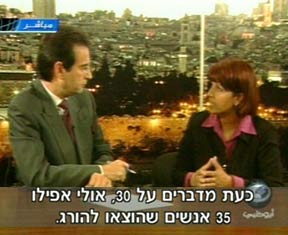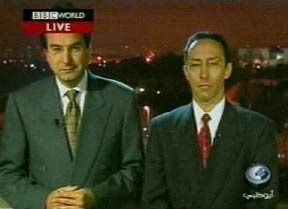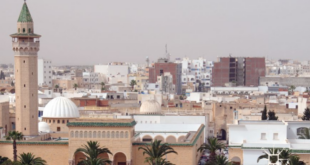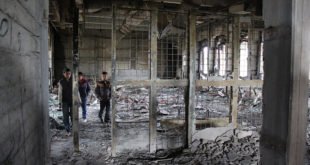"This Won't Be Limited to Abu Dhabi TV"
On April 6, 2002 journalists from Reuters, AP, and print and TV news organizations around the world reported on how a fellow journalist, Abu Dhabi Channel anchor and executive producer Jasim Al-Azzawi, was expelled from Jerusalem by the Israeli authorities.
Israel claimed it was because of biased coverage [see related story]; Al-Azzawi says it's because of Israel's antipathy towards the Abu Dhabi Channel. Al-Azzawi's expulsion came at a time when the BBC and other news organizations were protesting treatment their journalists received from Israel while trying to cover the current conflict in the West Bank. TBS spoke with Al-Azzawi in Cairo.
TBS: When did you arrive in Jerusalem?

Jasim Al-Azzawi: I was in Lebanon covering the Arab summit when I was asked to go to Ramallah to have an interview with Chairman Arafat. Immediately upon that call Natanya happened, while I was still in Lebanon, and they said you have to go. I landed in Jerusalem and immediately got in touch with the Palestinian Minister of Information and Culture Yasser Abed Rabbo. He said to me, you cannot come here, the area has been declared a closed military area, and no one can enter or leave the region. So instead of focusing on Arafat I started to do what I do at Abu Dhabi, which is presenting the news and doing reports. I co-anchored a bulletin from Jerusalem with my colleague in Abu Dhabi; my participation was half an hour and included several interviews with Palestinians from the Authority as well as from Hamas. With me, next to me, was our correspondent Leila Odeh.
We started the bulletin by stating that the Israelis had eliminated five members of the Palestinian police. They were executed in the Cairo-Amman bank. They were pictures that we actually got from Reuters, it wasn't even our pictures. It showed very clearly that these five police officers were shot at point-blank range. That's what we said, and we said that in our estimate it was execution-style, and later revelations showed that that's exactly what happened.
TBS: You weren't the only channel reporting this. Why were you expelled from the country and others weren't?
Al-Azzawi: We were not the only one, but the Israelis targeted us first and foremost because back in Ramadan we aired a thirty-episode satire, tongue in cheek, about Ariel Sharon; we called it "Irhabiyat" ("Terrorisms"). [Editor's note: This program appeared on Abu Dhabi TV, which airs a mix of news and entertainment programming, last November.] At the time the Israeli government exerted every possible influence worldwide, including going all the way to the White House, to try to pull those episodes. They pressured our minister for foreign affairs, Sheikh Hamdan, while he was meeting with Colin Powell, and the sheikh said no, this is our right.
TBS: Did Colin Powell or others in the administration put direct pressure on Abu Dhabi TV?
Al-Azzawi: Colin Powell himself intervened to get the episodes pulled. Our station stood firm and said no. The show was, in my opinion, perhaps a little bit overdone, but it was in fun.
So the Israelis targeted me first and foremost because of "Irhabiat." The following day Israeli Channel 2 started their main bulletin at 3:00 as well as at 11 with this story of me being asked to leave. Their story said that Abu Dhabi TV is here to instigate and broadcast inflammatory reports and is causing a lot of trouble. I was asked to go to the Israeli Government Press Office and meet with a gentleman named Daniel Seaman, the head of the GPO. In the meeting, with our correspondent Leila Odeh with me, I was told that my accreditation, which I got the day before, will be revoked. He asked me for the card, and I said I don't have it on me now, but I'll make sure you get it. Leila Odeh's accreditation was also suspended and is suspended as we speak. She's resorting to the Israeli High Court for a revocation.

TBS: But she's still there and continuing to file reports.
Al-Azzawi: She's still there and still reporting. I asked about the implication of the suspension until I leave—Seaman asked me to leave by Thursday—can I still report, still coanchor, and he said yes. That's exactly what I did. The second question I asked was if I'd have the deportation order in writing, and they said yes, so I said I'd wait for it. I continued with my work, continued interviews with members of the Palestinian Authority, and apparently they were watching this. There was another report done by Israeli Channel 2, which provoked the Israelis even more, and the papers started writing about this—Haaretz, Maariv, the Jerusalem Post. Some people said I should be kicked out immediately, others said this is the freedom of the press, we've been telling the world for fifty years that we're a free and democratic country, so he should be allowed to do his work.
I told the story to BBC World, and they asked if I would like to tell the story on-air. I said yes, and to be fair and impartial why not invite Daniel Seaman. So we had a head-to-head, Daniel Seaman and I, on BBC World with Nik Gowing last week [April 3] for about eight minutes. We both articulated our positions, and we taped it and carried it as well on Abu Dhabi TV.
On Friday I got a call at the Abu Dhabi TV office from Daniel Seaman, who said to me, "Are you still here?" I said yes; he said I was supposed to leave the day before. I said no, I'm supposed to receive my deportation orders, and they haven't arrived. He said, I'm telling you, you have to go. I said, I'm not going without the papers, and even then, I'll read them carefully and then decide. He said, so you're being a tough guy; I'm sending the police around to pick you up. Obviously things were coming to a head and something was going to happen, so I alerted my station, I went to the American Embassy and told them what was happening and filled out a complaint. They said, for the time being there's nothing we can do, you're a US citizen, but unless they come and get you there's nothing we can do. They gave me a 24-hour citizens help phone number at the consulate in case something happened.
Saturday around 9:20 pm I was alone at the bureau when three police officers walked in. I knew who they were, I was almost expecting them. Forty minutes later I was supposed to be live on air. They said, you have to come with us, we're taking you to the airport. I said no, I'm sorry, I can't go to the airport. I need to check out—my things are at the American Colony hotel—and more importantly I need to inform my embassy as well as my station. Let me make a phone call. They said no, you cannot make a phone call. We almost came to physical contact over the phone call request. So they took me to the police headquarters, they took my passport, asked me a few questions. They were very nervous, and almost abusive—I use the word "almost" very carefully. I tried to make sure they stayed calm. They said they were going to deport me to the US. When I asked why the US, they said because of my passport. I said I just came from Amman, I have a return ticket, and I need to go back there.
Besides, I asked them, the very reason you're deporting me is that you don't want publicity, right? Do you know what's going to happen if you deport me to Washington DC or to New York? The national and international media will be waiting there. It'll be a big circus, and you'd be shooting yourselves in the foot. If you deport me to Amman, a few stations might pick it up, but that will be it. They agreed.
But they said I couldn't go to the hotel. I said I had to, to pick up my things and pay my bill. They said they'd do it for me. I said no, there's my safety deposit box with all my money and credit cards and I'm the only one who can open it. Finally, we proceeded to the American Colony hotel in three cars. I was in one unmarked car, ahead of me was another car with two plainclothes officers, and there was an armored vehicle with several police officers. We parked about 100 meters from the hotel, and the first car went to have a check and came back and said on the walkie-talkie something like, everything's fine. The American Colony is the nest of international journalism—they didn't want cameras there, didn't want anybody there.
They chaperoned me in, not wanting me to talk to anybody. At reception there was a young man who knew me, and who said to me every day, ah, you haven't been deported yet? And I would say, no, but it's going to happen. He knew what was happening. He went to get my bill ready. We went upstairs and I went into the room, and they came inside. I said, wait, this is personal, I don't want you with me while I'm packing. They said no, we're going to be here. I told them I wanted to phone the American Embassy, and they said no, you can't make a phone call. I told them, you've promised me twice—you promised in the bureau that I could call from the police station, and you lied to me. Now you're lying to me. One way or the other, I'll let the American Embassy know what you're doing to me.
I packed, and as we went down in the elevator and came out on the first floor, somebody recognized me, and said, "Jasim—you're the one getting deported!" Next to him was a young lady, and he said to me, she's from Journalists Without Borders. She said, "Oh, you're the one being deported!" So the police officers started pushing me. I said to them, please don't touch me, don't ever touch me. I've been denied my rights, my passport has been confiscated, they don't allow me to make a phone call to the embassy, to my wife, or to my station. I need someone to call my wife and to call the embassy. While I way saying this, something like forty people—journalists hanging about the hotel—came out of nowhere. CNN, ABC, CBS, Fox, Reuters. There we were in the lobby, and the police kept telling me, let's go. I said no, I'm going to do it properly, I'm going to check my bill, pay my money, and meanwhile I need to make a phone call. He said no, you're not making a phone call.
I said, well, if you won't let me make a phone call, can I ask somebody here to call Leila, my wife. Someone asked for the number and they held the phone up over my head, and I yelled, Leila, if you can hear me, I'm in the lobby of the American Colony hotel, they've confiscated my passport, they've lied to me, they aren't allowing me to call the embassy. Please call the American Embassy in Abu Dhabi or let someone know. They're refusing to tell me where they're taking me—allegedly to Ben Gurion Airport, but I don't know, after they've lied to me.
Some American journalists there kept arguing with the police. They said, why are you treating him this way? Is this what you call democracy? Is this what you call freedom of the press? Why are you expelling him? The police were being out-shouted, and they kept telling me, let's go. I kept saying no, I need to call the embassy, they told me at the embassy that no matter what happens I have to call, and if I wasn't allowed to, that I should let the embassy know that and let them know the names.
Finally one of the police officers grabbed me and shoved me across the lobby and outside. Someone had a camera and started shooting it. Within an hour it was worldwide on Associated Press and Reuters. Two days ago I was sitting here in Cairo and watching Sam Donaldson and Dean Reynolds of ABC talking about the threat of journalists being expelled in Israel. They said, "Let's see what happened to the Abu Dhabi anchorman Jasim Al-Azzawy—he's been literally thrown out of Israel," and there was the footage.
They took me to Ben Gurion Airport and put me in a small room. This was about 12:45 at night, and they put me on a plane at 9:30 in the morning, so I was there almost nine hours.
TBS: Did you get to call the embassy or anyone else before leaving?
Al-Azzawi: They didn't let me call the embassy. But our correspondent was called; I refused to leave until I got my things, and some of them, including my mobile phone, were at the bureau. I told them I needed someone to call our correspondent and have her bring the phone; they said, we can't wait for that. Apparently by the time she got to the hotel I was gone, so she rushed immediately back to the station and gave a report. After that the story broke, on French TV, Spanish TV. I stayed in that room with ten other people. There was a British gentleman, married to an American, who runs the Friends School in Ramallah. He was being expelled. He had a mobile, and he let me call my wife—this was about 4:30 in the morning. I told her I was being held and would most likely be put on the first plane.
TBS: Did you know for sure where they were going to send you?
Al-Azzawi: I gave them the suggestion, because I had a ticket to Amman, and that way they wouldn't have to pay for it. That played a role. I was going to fall prey to the bureaucratic procedures otherwise—who would pay for the ticket, which carrier would take me. When I landed in Amman I left my luggage at the airport, went downtown, collected enough media, gave them a press report, then came back and got on the first plane to Cairo.
When they decided to expel me, my station issued a press release; the gist of it is that in principle we are against expulsion of journalists, we are for the freedom of the press and this is a limitation on that freedom. I got that press release, and went up and down several floors of the hotel, and everyone signed it—ABC, CNN, AP—in support of my case, and we sent it to many organizations.
TBS: Why did you come to Cairo?
Al-Azzawi: I have a weekly political show called "Crossfire," or "Muwajjaha," which is every Monday night. Because of the events and the emergency meeting of the Arab foreign ministers that was held in Cairo, I thought it was quite appropriate to have Amr Moussa on. Two days ago he was very, very forceful in messages on behalf of the Arabs to the Americans, the Israelis, and the Europeans. It was quite appropriate for me to come to Cairo to do this.
Sullivan: Are your correspondents who are there right now having problems? Are they being harassed?
Al-Azzawi: When it comes to the way Israel handles the media, I have a few comments. In the very press release issued by Daniel Seaman outlining the reasons for my expulsion and Leila Odeh's suspension, there were some ominous signs that this will not be limited to Abu Dhabi TV. Specifically, Michael Holmes of CNN was warned, as well as Ashleigh Banfield of MSNBC. Two or three days ago our bureau in Ramallah was kicked in and the whole office was destroyed, our correspondents were asked to explain their positions and who was in the rooms, and were terribly, terribly mishandled in a very rough way. Daniel Seaman told me, and I'm quoting, the action against you and Abu Dhabi TV will not be limited to you. In the next few days it will expand to include other Western and American organizations. We cannot afford the way they are handling it. Some people will be restricted, a few stations will be closed, and many journalists will be expelled.
 Arab Media & Society The Arab Media Hub
Arab Media & Society The Arab Media Hub




